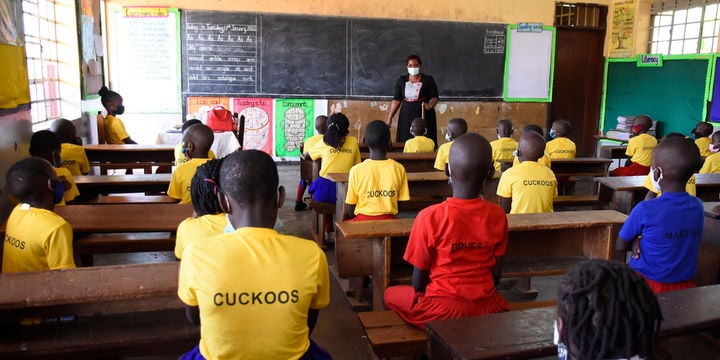Prime
Govt to review curriculum rolled out in Covid year

The directorate of industrial training officials led by the acting executive director, Mr Patrick Byakatonda (left) and the Board chairperson Ruth Biyinzika (centre) receiving the best TVET institution of 2021 visionaries award presented by the Vice President Jessica Alupo (2nd left). PHOTOS/ SHABIBAH NAKIRIGYA
What you need to know:
- There are 180 occupations/skill subjects but each student is supposed to sit depending on the available materials.
Government through Directorate of Industrial Training (DIT) has revealed that it will start assessing lower secondary students on the new curriculum next year .
The curriculum was rolled out in February 2020 with the aim of meeting learners’ needs, especially in regard to skills training and enhancement.
The National Curriculum Development Centre (NCDC) also reduced the subjects for the lower secondary from 43 to 21.
In the new curriculum, schools teach 12 subjects in Senior One and Two, of which 11 are compulsory. Students at levels Three and Four will do a minimum of eight or a maximum of nine subjects, seven of which are compulsory.
Speaking to the media during the engagement meeting with vocational institutions in Kampala yesterday, The DIT Executive Director, Mr Patrick Byakatonda, said the students who will be assessed next year started with the new curriculum in 2021.
“The Education ministry through DIT will be assessing Senior Three next year and we have started accrediting secondary schools at DIT assessment centres and we have accredited 2,000 schools out of 3,500, for those with Uganda National Examination Board centres,” he said.
Mr Byakatonda added that by next term (first term, 2023) they expect to be done with accrediting and start with registration of schools and candidates.
There are 180 occupations/skill subjects but each student is supposed to sit depending on the available materials.
“Students will be assessed on competence level and its done in Senior Three and it is equivalent to Uganda Certificate of Education ( UCE),”he said.
The deputy director-in-charge of assessment and certification at DIT, Mr Michael Okumu, said although the national assessment for Senior Three starts next year, some schools are already on board and their candidates were assessed in this year’s final examinations.
“We have assessed 11 secondary schools from Senior Three, Four and Six, who have been trained since Senior One. Since more accredited centres and institutions are getting involved in training and getting candidates registered for assessment, the number has increased from between 200 to 545 each year,” he said.
Mr Okumu added that secondary schools will be assessed in Level One throughout the country. The Level One candidates must be trained for more than one year.




